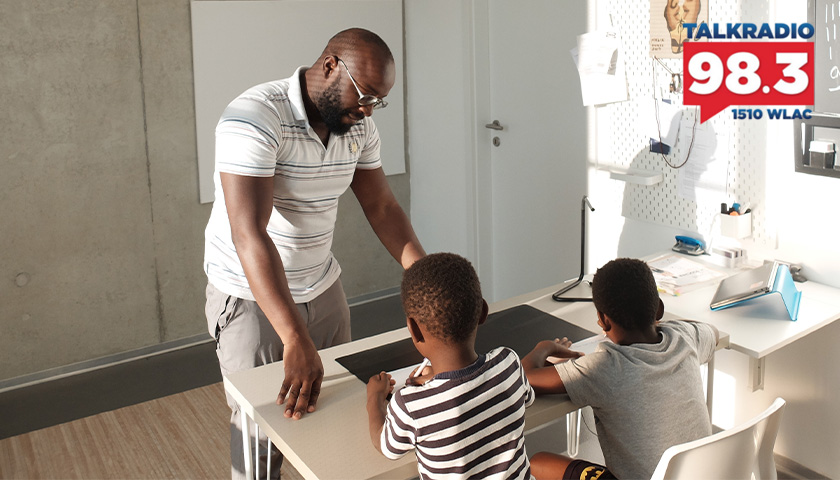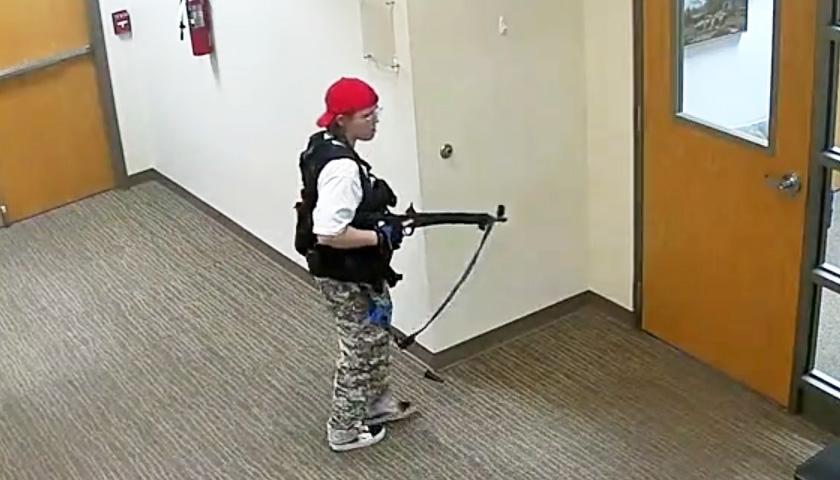Live from Music Row Tuesday morning on The Tennessee Star Report with Michael Patrick Leahy – broadcast on Nashville’s Talk Radio 98.3 and 1510 WLAC weekdays from 5:00 a.m. to 8:00 a.m. – host Leahy welcomed the president of the Tennessee Home Education Association, Claiborne Thornton, in the studio to explain the components that make up an educated citizenry.
Leahy: We’re talking about home schooling and home education and the state of education in Tennessee today. Our guest in the studio, Claiborne Thornton, who since 1984 – just a few years ago, that would be 38 years ago – has been the president of the Tennessee Home Education Association. Now there are 200,000 students in Tennessee that are home-schooled.
Thornton: Somewhere in that range. That’s hard to know exactly how many.
Leahy: But that’s a lot of kids and it’s been growing a lot. And you were talking a little bit about the role of education. You brought to my attention something I’ve never read before. This is a clause from the Constitution of the State of Tennessee.
I’ll read it and then get your reflection on it. This is Article 11, Section 12 of the Constitution of the State of Tennessee.
“The State of Tennessee recognizes the inherent value of education and encourages its support. The General Assembly shall provide for the maintenance, support, and eligibility standards of a system of free public schools.”
That’s right there in the Tennessee Constitution. I didn’t know that. I ought to know that, but I didn’t until you brought it up to me right now.
Thornton: For a republic to continue, we’re a constitutional republic. And for it to continue, we must have an educated citizenry. We must have an educated citizenry. And so that got me to think about, okay, what is an educated citizen?
What does a person who is educated enough to understand and appreciate the value of a constitutional republic, what does that person need to know? What do they need to know? And I think that’s something that deserves some serious studying.
Leahy: Let’s start off with, they ought to be able to read and write and do arithmetic. Start off with that, right?
Thornton: Bing, bing, bing. Yes.
Leahy: What else do they need to know? Well, I think they need to understand something about civics. They need to understand the different forms of governments among men, because there are several different forms, and we see dictatorships and we hear of oligarchies and we hear of constitutional republics, and other forms.
So we need to understand what those forms are and how to recognize them. What are the characteristics? I say that a government is there primarily to do three things: to write the law, to adjudicate the law, and to administer the law.
Leahy: Three branches, the executive, judicial, and legislative branch, right there in our constitution …
Thornton: Right there in the constitution …
Leahy: … as checks and balances.
Thornton: Checks and balances, exactly.
Leahy: Because as James Madison once said, men are not angels – or women, for that matter. He meant it generically.
Thornton: And interestingly, that comes right out of Isaiah 33:22. God is our judge, he’s our lawgiver, he’s our king. It is he that will save us. So that’s where the founders of our country got the concept of the three branches.
Leahy: One of our good friends has just texted me, wants to know about a documentary. Is there a documentary on Tennessee home schooling going on here at all? Are you familiar with that?
Thornton: No.
Leahy: Not familiar. Well, I’m sure there’s one out there. We’ll learn from another guest about the documentary. Let’s go back to the education of a citizen.
Thornton: To me, it’s something that deserves a serious amount of contemplation, because rather than the legislature trying to dictate what is taught in the schools, I would rather see us evaluate the students coming out of schools and see if they get the basic concepts that are necessary for our republic to continue. Because right now, I think our republic is in jeopardy of continuing.
Leahy: Well, yes. The classic response from Ben Franklin when he came out of the Constitutional Convention and Mrs. Powell – this is probably an apocryphal story, may not be – Mrs. Powell, a socialite in Philadelphia when he emerged from the Constitutional Convention was asked in September 1787, what, sir, have you given us? To which he responded…
Thornton: A republic, if you can keep it.
Leahy: Boy. Is there a better description of the constant battle to maintain a constitutional republic than that?
Thornton: It couldn’t be more clearly stated in such a succinct way.
Leahy: Now, you want to talk about how we educate citizens and young kids. How are we doing? How are home schoolers doing? How are K-12 public school kids doing? How are private schools doing?
Thornton: I don’t have a sense of the measurement of that. It’s just something to be endeavored to accomplish.
Leahy: You’re doing a lot at Tennessee Home Education Association to promote an understanding of civics. Tell us about some of these competitions that you do. We know about them because of course we do, and just completed on Saturday, our 6th Annual National Constitution Bee.
Thornton: Awesome.
Leahy: And many of our winners have been home-schooled kids, because they’re well-trained.
Thornton: Tennessee Home Education Association, established Christian Communicators of Tennessee in an effort to have a system of training students and teaching speech and debate across the state. So we want to encourage the formation of clubs. One in every county would be perfect, and maybe some of the larger counties.
Leahy: So you have this big debate, training, competition. It happens, what? Every November.
Thornton: My wife is head of one of the clubs, and she’s got a tournament that she hosts in November. We got one coming up, and then we have another one coming up in February. In addition to that, we also encourage the learning of what we call student congress.
And we just had an in-house student congress tournament a couple of weekends ago. And then we’ll have another one associated with our rally day, which we host at the Capitol each year.
Last year, we were able to host a session in the House chamber and the Senate chamber as part of our rally day, where students come in, they write bills in advance of coming there.
They prepare speeches for and against the different bills that have been discussed. And we have a parliamentarian and a leader of the event in both Houses, and they conduct events much like our legislature does.
It’s a training ground, because whether you’re in civil government at the state level, the federal level, the county level, city level, most of those are conducted with Robert’s Rules of Order, with a very orderly process. And so it’s a matter of learning that process so that they can be skilled local citizens in their community.
Leahy: YAnd that’s been a very successful program.
Thornton: Yes, it’s successful, and it’s a lot of fun. It’s amazing to see the light come on and see those kids learn how to dive into a topic. Right now, we have a friend – the topic he studied for the Teen Policy Debate is the idea that you have a policy that you debate the entire year, so you may be in tournaments in 10 different locations around the country debating that topic.
And he completed that topic that he was working on and wound up getting a job, remotely, working in Hawaii because he was familiar with the topic that the island state has to deal with on a regular basis.
Listen to today’s show highlights, including this interview:
– – –
Tune in weekdays from 5:00 – 8:00 a.m. to The Tennessee Star Report with Michael Patrick Leahy on Talk Radio 98.3 FM WLAC 1510. Listen online at iHeart Radio.
Photo “Homeschool” by Basil Otshudi.








